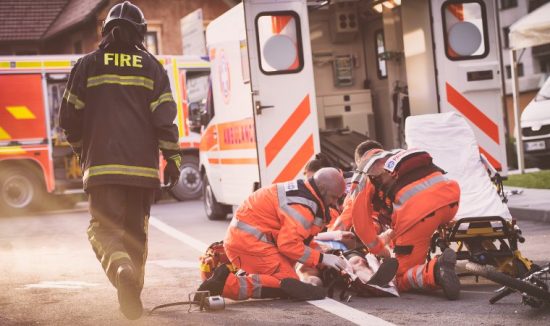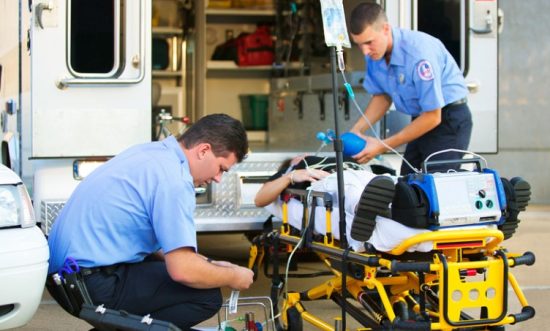Are you looking for a career that involves helping others in need? Do you have a passion for emergency response and want to make a difference in your community? If so, becoming a paramedic may be the perfect path for you. As one of the most challenging but rewarding professions, being a paramedic requires technical skills and emotional intelligence.
In Ontario, there are several steps involved in becoming a qualified paramedic. In this blog post, we’ll explore how to become a paramedic in Ontario and highlight some top courses available to help jump-start your career!
Who is a Paramedic?
A paramedic is a healthcare professional who provides emergency medical services to patients in need. They are often the first responders on an accident or medical emergency scene and are responsible for assessing, treating, and stabilizing patients before transporting them to hospitals in Ontario.
Paramedics play a crucial role in saving lives and providing compassionate care during times of crisis. They work closely with other healthcare team members, such as doctors, nurses, and other emergency personnel, to ensure patients receive the best care.
Becoming a paramedic requires dedication and hard work but can be incredibly rewarding for those with a passion for helping others. In addition, paramedics must possess excellent communication skills, be able to remain calm under pressure and think critically when making decisions regarding patient care.
Paramedics serve as essential members of their communities by providing life-saving services when they’re needed most. If you’re interested in pursuing this exciting career path in Ontario, read on to learn more about what it takes to become a qualified paramedic!
What Does Paramedic Do?

Paramedics are highly trained healthcare professionals who respond to emergency situations such as accidents, medical emergencies, and natural disasters. They work in high-pressure environments where quick thinking and decisive action can make all the difference.
When paramedics arrive at an emergency scene, they aim to assess the patient’s condition and provide immediate care. This may involve administering medications or performing life-saving interventions such as CPR or defibrillation.
Additionally, paramedics take patients to hospitals or other healthcare institutions for additional care. They monitor the patient’s vital signs during transportation and adjust their care accordingly.
How to Become a Paramedic in Ontario?
Becoming a paramedic in Ontario is a challenging yet rewarding career path. It requires dedication, hard work, and the right training to become successful in this field. You can begin your journey toward becoming a paramedic by following the steps outlined above.
Remember that being a paramedic is not just about responding to emergencies or saving lives. It’s also about community involvement and providing care for those who need it most. So if you’re passionate about helping others and making a difference in people’s lives, pursuing a career as a paramedic may be the perfect fit.
Requirements to Become a Paramedic
To become a paramedic in Ontario, there are specific requirements that you must meet. These requirements ensure that aspiring paramedics have the necessary skills, knowledge, and abilities to provide critical medical care during emergencies.
Firstly, you must be at least 18 years of age and possess a valid Class F driver’s license or higher. This requirement is essential as it allows you to drive an ambulance while responding to emergencies.
Secondly, completing high school education or equivalent is required along with CPR certification. Many aspiring paramedics choose to pursue post-secondary education in health sciences or related fields before enrolling in a paramedic program.
Thirdly, candidates should also possess physical fitness and mental health, which can be assessed through various tests. Paramedics work in highly stressful environments; thus, they require excellent emotional stability under pressure.
Last but not least important is criminal record check clearance, as all healthcare providers need safe access to vulnerable populations like patients, which may include children and seniors.
Meeting these requirements is vital for anyone who wishes to pursue a career as a paramedic in Ontario.
Complete the Paramedic Diploma

Completing the paramedic diploma is essential to becoming a licensed paramedic in Ontario. The diploma programme is meant to give students the expertise and abilities needed to deliver emergency medical care.
Various community colleges, universities and private institutions across Ontario offer paramedic programs. These programs usually consist of classroom lectures, practical hands-on training in labs and clinical settings, as well as field placements where students work alongside experienced paramedics.
The program’s primary focus is building a strong foundational knowledge of human anatomy, physiology, pharmacology and pathophysiology. Students also learn about patient assessment techniques, basic life support (BLS) protocols and advanced life support (ALS) interventions.
Pass the Entry to Practice Exam
Once you have completed the paramedic diploma program, the next step is passing the Entry to Practice exam. This exam is mandatory for anyone looking to become a registered paramedic in Ontario. It tests your knowledge and skills in emergency medical care and determines whether or not you are ready to enter into practice.
The exam consists of written and practical components that evaluate your understanding of anatomy, pharmacology, patient assessment, critical thinking and decision-making abilities. You must pass both components of the test before you can obtain your license as a paramedic.
It’s important that you prepare well for this exam by revising all relevant material learned during your training program. Consider taking mock exams or attending review sessions offered by local colleges or universities.
Don’t be afraid if you don’t pass on the first attempt – many people need multiple attempts before they successfully gain their license as a paramedic. Remain focused on studying hard and staying committed to achieving your goal of becoming a successful healthcare professional!
Get a Paramedic License

After completing the paramedic diploma and passing the entry to practice exam, the next step to becoming a licensed paramedic in Ontario is obtaining your license from the Ministry of Health.
To apply for a paramedic license, you’ll need to provide proof of completion of your education and certification exams. You’ll also need to submit an application form along with any required fees.
It’s important to note that different types of paramedics may have additional requirements for licensure, such as completing certain courses or having experience in specific areas. Be sure to check with your program or regulatory body for more information.
Once you’ve obtained your license, keeping up with continuing education requirements and maintaining good standing with the regulatory body overseeing your practice is crucial. This ensures that you’re able to continue providing high-quality care as a paramedic and protects both yourself and your patients.
Obtaining a paramedic license is essential to becoming a practicing professional in Ontario’s emergency medical services field. It requires fulfilling all necessary educational requirements, passing certification exams, and submitting an application form along with any applicable fees.
Work as a Paramedic
After completing the necessary training and obtaining your paramedic license, you can finally begin working as a paramedic in Ontario. As a paramedic, you will be responsible for responding to emergency calls and providing medical care to patients in need.
Working as a paramedic can be both challenging and rewarding. You will be able to make a real difference in people’s lives by providing critical care when needed most. You may also work alongside other first responders, such as police officers and firefighters in Ontario.
In addition to responding to emergencies, you may also participate in community outreach events or provide training on topics such as CPR or first aid.
Becoming a paramedic in Ontario requires dedication, hard work, and commitment to helping others. But for those who are passionate about healthcare and making a difference in their communities, it can be an incredibly fulfilling career path.
Different Courses for Paramedic
To become a paramedic in Ontario, you must first complete the required education and training. Different courses are available to aspiring paramedics, each with varying skills and knowledge.
- Primary Care Paramedic (PCP) program
- Advanced Care Paramedic (ACP) program
- Critical Care Paramedic (CCP)
Choosing a course depends on your interest level in pursuing your career goals; ACPs and CCPs pave the way for broader career opportunities than PCPs.
Primary Care Paramedic

A Primary Care Paramedic (PCP) is an entry-level position in paramedicine. As a PCP, you’ll be the first to arrive at an emergency scene and provide immediate patient care. This includes assessing vital signs, administering medications, immobilizing fractures, and performing life-saving interventions.
To become a PCP in Ontario, you must complete a college diploma program that the Canadian Medical Association accredits. The program usually takes two years to complete, including classroom instruction and hands-on training through clinical placements.
Some of the courses you may take during your PCP program include anatomy and physiology, pharmacology, patient assessment techniques, medical emergencies management and trauma management.
Upon completing your diploma program, you must pass written and practical exams before being licensed as a primary care paramedic in Ontario. Once licensed, You can work for ambulance services or healthcare organizations that require emergency medical services.
Becoming a PCP is rewarding and allows individuals to help save lives while working with highly trained professionals in high-stress situations.
Advanced Care Paramedic
As a paramedic, you can specialize and advance your career by becoming an Advanced Care Paramedic (ACP). An ACP has more training and skills than a Primary Care Paramedic (PCP) or Emergency Medical Responder (EMR).
To become an ACP in Ontario, you must first complete the requirements to become a PCP. Then, you can enroll in an advanced care program that includes additional coursework on pharmacology, advanced airway management, and electrocardiogram interpretation.
An ACP is authorized to administer certain medications, perform procedures like intubation and defibrillation, and interpret ECGs. They are trained to manage patients with complex medical conditions such as cardiac arrest or traumatic injuries.
ACP courses usually take about 18-24 months to complete. However, this varies depending on the program’s structure. The cost of these programs also varies but tends to be higher than that of PCP programs due to the extra training required.
Critical Care Paramedic

A Critical Care Paramedic is an advanced level of paramedic training that requires additional education and skills beyond the Primary Care and Advanced Care Paramedic levels. These highly trained professionals are equipped to manage complex medical emergencies, including patient transport by helicopter or fixed-wing aircraft.
Critical Care Paramedics typically work in specialized environments such as critical care air ambulance services, inter-hospital transfer teams, or special event medical teams. They provide advanced life support measures such as mechanical ventilation, arterial line placement, and administration of medications for patients with critical illness or injury.
To become a Critical Care Paramedic in Ontario, candidates must first complete their Primary Care and Advanced Care Paramedic training. They must then obtain certification through the Canadian Society of Respiratory Therapists (CSRT) or hold a recognized ICU certification from an accredited college program.
The Critical Care Paramedic course includes extensive classroom instruction combined with clinical rotations in intensive care units and emergency departments. The course duration is typically three to four months full-time or up to one year part-time, depending on the program.
Conclusion
After reading this blog post, you should understand what it takes to become a paramedic in Ontario. It’s not an easy path, but it can be incredibly rewarding for those passionate about helping others and providing emergency medical care.
To become a paramedic in Ontario, you’ll need to complete the necessary educational requirements and pass the entry-to-practice exam. Once you’ve obtained your license, you’ll be able to work as a paramedic and provide critical care services to those in need.
FAQ – How to Become a Paramedic in Ontario?

How many years does it take to become a paramedic in Ontario?
The length of time it takes to become a paramedic in Ontario depends on the level of certification that you are seeking. To become a Primary Care Paramedic (PCP), an entry-level position, you must complete a two-year college diploma program. This program includes both classroom instruction and practical training in emergency medical services.
What education do you need to become a paramedic in Ontario?
To become a paramedic in Ontario, you must first have a high school diploma or equivalent. Passing an aptitude test and obtaining certifications in CPR and basic life support is also required.
After completing these initial requirements, aspiring paramedics can enrol in a Paramedic Diploma program at a community college or university. The program usually takes two to three years to complete and provides students with the necessary knowledge and skills for entry-level positions as primary care paramedics.
The curriculum of the Paramedic Diploma program covers subjects such as anatomy, physiology, pharmacology, emergency medical procedures, patient assessment techniques, communication skills, and more. Students will also undergo clinical rotations where they can apply their classroom learning in real-life settings under supervision.
Upon completion of the Paramedic Diploma program, graduates are eligible to take the Entry-to-Practice exam administered by the Ministry of Health. Passing this exam grants individuals licensed status as Primary Care Paramedics (PCP).
While additional education beyond the diploma level is not mandatory for employment as a PCP in Ontario’s ambulance services; however obtaining further certificates such as Advanced Care Paramedic (ACP) or Critical Care Paramedic (CCP) would allow them greater versatility on duty.
What is the difference between EMTs and paramedics in Canada?
In Canada, the terms Emergency Medical Technician (EMT) and Paramedic are often used interchangeably. However, there is a difference between these two roles in terms of training and scope of practice.
An EMT in Canada typically completes a shorter training program than a paramedic. They are trained to provide basic life support measures such as administering oxygen, controlling bleeding, and providing CPR. EMTs may work for private ambulance companies or public emergency services.
On the other hand, paramedics undergo more extensive training and have a broader scope of practice. In addition to providing basic life support measures, they can administer medications, interpret electrocardiograms (ECGs), perform advanced airway management techniques like intubation, and defibrillate patients in cardiac arrest.
Paramedics may work for hospitals or fire departments besides traditional ambulance services. Some paramedics also specialize in critical care transport, providing advanced medical interventions during interfacility transfers.
It’s important to note that both EMTs and paramedics play crucial roles in emergency medical response systems across Canada. Each role requires unique skills and abilities that contribute to saving lives every day.
How much does it cost to become a paramedic in Ontario?
Becoming a paramedic in Ontario requires an investment in education and training. The cost varies depending on your chosen program and whether you attend a public or private institution. The primary care paramedic (PCP) program is typically the least expensive option, with costs ranging from $5,000 to $15,000. This includes tuition fees, textbooks, uniforms, equipment and clinical placements.
On the other hand, advanced care paramedic (ACP) programs can range from $10,000 to $30,000 due to their longer duration and more advanced curriculum. Critical care paramedic (CCP) courses are even more specialized and can be much pricier.
What degree is best for a paramedic?
The bachelor’s degree programme in emergency medical services trains paramedics with the skills they need to practise at the highest level and advance to leadership positions in their industry. This programme aims to address the specialized educational requirements of the working paramedic precisely.










